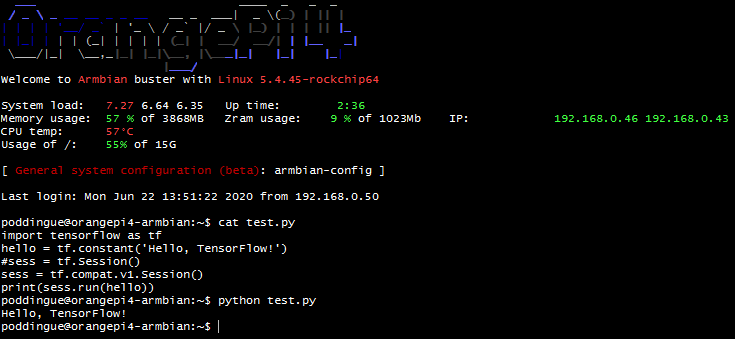Installing TensorFlow on the Orange Pi 4B

This quick howto is heavily based on Orange Pi’s documentation. To this day, Orange Pi recommended versions of TensorFlow and Python are quite old:
TensorFlow:1.14.0 Python environment:python2.7
Installation of Python environment and dependencies
sudo apt-get install python-pip python-dev libatlas-base-dev
[sudo] password for poddingue:
Reading package lists... Done
Building dependency tree
Reading state information... Done
python-dev is already the newest version (2.7.16-1).
The following additional packages will be installed:
libatlas3-base python-pip-whl
Suggested packages:
libatlas-doc liblapack-doc
Recommended packages:
python-all-dev python-setuptools python-wheel
The following NEW packages will be installed:
libatlas-base-dev libatlas3-base python-pip python-pip-whl
Need to get 7,168 kB of archives.
After this operation, 40.1 MB of additional disk space will be used.
Do you want to continue? [Y/n]
Get:1 http://debian.proxad.net/debian buster/main arm64 libatlas3-base arm64 3.10.3-8 [2,409 kB]
Get:2 http://debian.proxad.net/debian buster/main arm64 libatlas-base-dev arm64 3.10.3-8 [2,954 kB]
Get:3 http://debian.proxad.net/debian buster/main arm64 python-pip-whl all 18.1-5 [1,591 kB]
Get:4 http://debian.proxad.net/debian buster/main arm64 python-pip all 18.1-5 [215 kB]
Fetched 7,168 kB in 1s (8,178 kB/s)
Selecting previously unselected package libatlas3-base:arm64.
(Reading database ... 112671 files and directories currently installed.)
Preparing to unpack .../libatlas3-base_3.10.3-8_arm64.deb ...
Unpacking libatlas3-base:arm64 (3.10.3-8) ...
Selecting previously unselected package libatlas-base-dev:arm64.
Preparing to unpack .../libatlas-base-dev_3.10.3-8_arm64.deb ...
Unpacking libatlas-base-dev:arm64 (3.10.3-8) ...
Selecting previously unselected package python-pip-whl.
Preparing to unpack .../python-pip-whl_18.1-5_all.deb ...
Unpacking python-pip-whl (18.1-5) ...
Selecting previously unselected package python-pip.
Preparing to unpack .../python-pip_18.1-5_all.deb ...
Unpacking python-pip (18.1-5) ...
Setting up libatlas3-base:arm64 (3.10.3-8) ...
update-alternatives: using /usr/lib/aarch64-linux-gnu/atlas/libblas.so.3 to provide /usr/lib/aarch64-linux-gnu/libblas.so.3 (libblas.so.3-aarch64-linux-gnu) in auto mode
update-alternatives: using /usr/lib/aarch64-linux-gnu/atlas/liblapack.so.3 to provide /usr/lib/aarch64-linux-gnu/liblapack.so.3 (liblapack.so.3-aarch64-linux-gnu) in auto mode
Setting up libatlas-base-dev:arm64 (3.10.3-8) ...
update-alternatives: using /usr/lib/aarch64-linux-gnu/atlas/libblas.so to provide /usr/lib/aarch64-linux-gnu/libblas.so (libblas.so-aarch64-linux-gnu) in auto mode
update-alternatives: using /usr/lib/aarch64-linux-gnu/atlas/liblapack.so to provide /usr/lib/aarch64-linux-gnu/liblapack.so (liblapack.so-aarch64-linux-gnu) in auto mode
Setting up python-pip-whl (18.1-5) ...
Setting up python-pip (18.1-5) ...
Processing triggers for man-db (2.8.5-2) ...
Processing triggers for libc-bin (2.28-10) ...
Install TensorFlow
There are several ways to install TensorFlow, but here we will install if from a downloaded binary. Download the PIP installation package for TensorFlow from the following page: https://github.com/lhelontra/tensorflow-on-arm/releases/tag/v1.14.0 .
This should give something like:
curl "https://github.com/lhelontra/tensorflow-on-arm/releases/download/v1.14.0/tensorflow-1.14.0-cp27-none-linux_aarch64.whl" --output tensorflow-1.14.0-cp27-none-linux_aarch64.whl
Now, let’s use PIP to install TensorFlow.
pip install tensorflow-1.14.0-cp27-none-linux_aarch64.whl
Processing ./tensorflow-1.14.0-cp27-none-linux_aarch64.whl
Collecting keras-preprocessing>=1.0.5 (from tensorflow==1.14.0)
Downloading https://files.pythonhosted.org/packages/79/4c/7c3275a01e12ef9368a892926ab932b33bb13d55794881e3573482b378a7/Keras_Preprocessing-1.1.2-py2.py3-none-any.whl (42kB)
100% |████████████████████████████████| 51kB 2.5MB/s
Collecting enum34>=1.1.6 (from tensorflow==1.14.0)
Downloading https://files.pythonhosted.org/packages/6f/2c/a9386903ece2ea85e9807e0e062174dc26fdce8b05f216d00491be29fad5/enum34-1.1.10-py2-none-any.whl
Collecting wheel (from tensorflow==1.14.0)
Downloading https://files.pythonhosted.org/packages/8c/23/848298cccf8e40f5bbb59009b32848a4c38f4e7f3364297ab3c3e2e2cd14/wheel-0.34.2-py2.py3-none-any.whl
Collecting wrapt>=1.11.1 (from tensorflow==1.14.0)
Downloading https://files.pythonhosted.org/packages/82/f7/e43cefbe88c5fd371f4cf0cf5eb3feccd07515af9fd6cf7dbf1d1793a797/wrapt-1.12.1.tar.gz
Complete output from command python setup.py egg_info:
Traceback (most recent call last):
File "<string>", line 1, in <module>
ImportError: No module named setuptools
----------------------------------------
Command "python setup.py egg_info" failed with error code 1 in /tmp/pip-install-Dd0045/wrapt/
Of course…
sudo apt-get install -y python-setuptools
[...]
error: invalid command 'bdist_wheel'
Damn!
pip install wheel
And
export PATH=$PATH:/home/poddingue/.local/bin
in ~/.bashrc, because of
pip install wheel
Collecting wheel
Using cached https://files.pythonhosted.org/packages/8c/23/848298cccf8e40f5bbb59009b32848a4c38f4e7f3364297ab3c3e2e2cd14/wheel-0.34.2-py2.py3-none-any.whl
Installing collected packages: wheel
The script wheel is installed in '/home/poddingue/.local/bin' which is not on PATH.
Consider adding this directory to PATH or, if you prefer to suppress this warning, use --no-warn-script-location.
Successfully installed wheel-0.34.2
Let’s issue once more `
pip install tensorflow-1.14.0-cp27-none-linux_aarch64.whl
error: libhdf5.so: cannot open shared object file: No such file or directory
Bad luck.
Command "/usr/bin/python -u -c "import setuptools, tokenize;__file__='/tmp/pip-install-irkqLB/h5py/setup.py';f=getattr(tokenize, 'open', open)(__file__);code=f.read().replace('\r\n', '\n');f.close();exec(compile(code, __file__, 'exec'))" install --record /tmp/pip-record-N9oIr_/install-record.txt --single-version-externally-managed --compile --user --prefix=" failed with error code 1 in /tmp/pip-install-irkqLB/h5py/
Something must be missing…
Command "/usr/bin/python -u -c "import setuptools, tokenize;__file__='/tmp/pip-install-irkqLB/h5py/setup.py';f=getattr(tokenize, 'open', open)(__file__);code=f.read().replace('\r\n', '\n');f.close();exec(compile(code, __file__, 'exec'))" install --record /tmp/pip-record-N9oIr_/install-record.txt --single-version-externally-managed --compile --user --prefix=" failed with error code 1 in /tmp/pip-install-irkqLB/h5py/
Not better… I think the machine is trying to tell me something… A missing library perhaps?
sudo apt install python-h5py
pip install tensorflow-1.14.0-cp27-none-linux_aarch64.whl
[...]
Successfully installed astor-0.8.1 backports.weakref-1.0.post1 funcsigs-1.0.2 gast-0.3.3 google-pasta-0.2.0 keras-applications-1.0.8 mock-3.0.5 tensorflow-1.14.0 tensorflow-estimator-1.14.0 termcolor-1.1.0
rm tensorflow-1.14.0-cp27-none-linux_aarch64.whl
It worked!
Now, let’s edit a test.py file:
import tensorflow as tf
hello = tf.constant('Hello, TensorFlow!')
#sess = tf.Session()
sess = tf.compat.v1.Session()
print(sess.run(hello))
python test.py
Hello, TensorFlow!
We all have to start somewhere, don’t we?
TL;DR
sudo apt-get install -y python-setuptools python-h5py python-pip python-dev libatlas-base-dev
curl -L "https://github.com/lhelontra/tensorflow-on-arm/releases/download/v1.14.0/tensorflow-1.14.0-cp27-none-linux_aarch64.whl" --output tensorflow-1.14.0-cp27-none-linux_aarch64.whll
pip install wheel
pip install tensorflow-1.14.0-cp27-none-linux_aarch64.whl
cat >> ~/.bashrc
export PATH=$PATH:/home/poddingue/.local/bin
CTRL+D
source ~/.bashrc